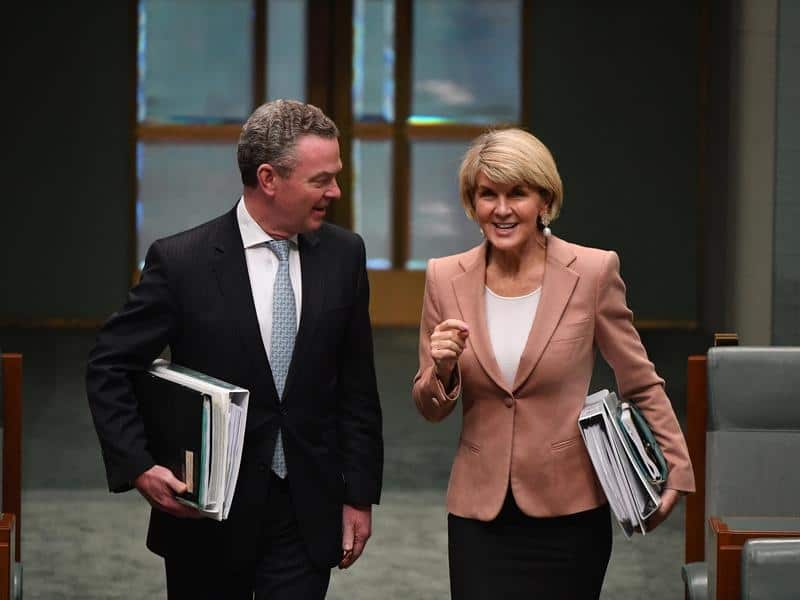Neither Christopher Pyne nor Julie Bishop had a conversation with the prime minister about how the ministerial standards applied to their controversial post-politics jobs.
The former defence and foreign ministers have faced a grilling from senators amid accusations their new roles may breach the standards that prevent ex-ministers from lobbying government for 18 months or revealing secret information they learned while in cabinet.
Mr Pyne has joined a lobbying consultancy set up by his former chief of staff, which includes a role with services giant EY, while Ms Bishop has joined the board of aid contractor Palladium.
To the ire of some, both Mr Pyne and Ms Bishop appeared via teleconference.
The two former politicians have denied breaching the ministerial standards.
Ms Bishop said she regarded the ministerial standards as voluntary because they were not legislated.
But she had never discussed that view with any of the prime ministers under which she served.
"When Mr Turnbull was prime minister, I was not planning to retire from the cabinet," she said after being asked if she had discussed the guidelines with him or with Scott Morrison, on whose frontbench she never served.
"I didn't have a conversation with anybody else about my understanding of the guidelines."
Mr Pyne said new ministers had to sign financial documents that included a copy of the standards.
"That is, in my view, a contract that you have created with the prime minister at the time, whether it was Howard, Abbott, Turnbull or Morrison," he said, but agreed that was not legally enforceable.
He had not discussed the code of conduct with Mr Morrison, nor how it might apply to any employment he took after retiring from parliament.
"There was no exit interview," he said.

Former ministers Christopher Pyne and Julie Bishop say their post-parliament jobs don't breach ministerial standards. Source: AAP
South Australian senator Rex Patrick said going from defence minister to defence consultant was a "bridge too far".
Transparency International's Serena Lillywhite said lobbying had its merits but the system was broken.
"Increasingly in Australia, access of influence is heavily skewed towards the interest of businesses, special interest groups and powerful individuals," she told the inquiry.
"And the recent appointment of [the two ex-ministers] does in our view illustrate weaknesses in the regulation and oversight of ministerial standards."
'Revolving door' challenge
The inquiry has been urged to consider the broader issue of the "revolving door" between politics and lobbying roles.
The Grattan Institute has argued the current restrictions on former MPs' conduct in the 18 months after they leave parliament are unenforceable because it is up to the prime minister to determine a breach.
In a submission to the committee, the think tank called for an independent investigation process to be established.
"Such arms-length administration of the rules is necessary to build public confidence that codes of conduct are respected and adhered to."
The Grattan Institute also suggests penalties for a breach include being barred from Parliament House, political party functions and fines.
With additional reporting from Rosemary Bolger.
Share

